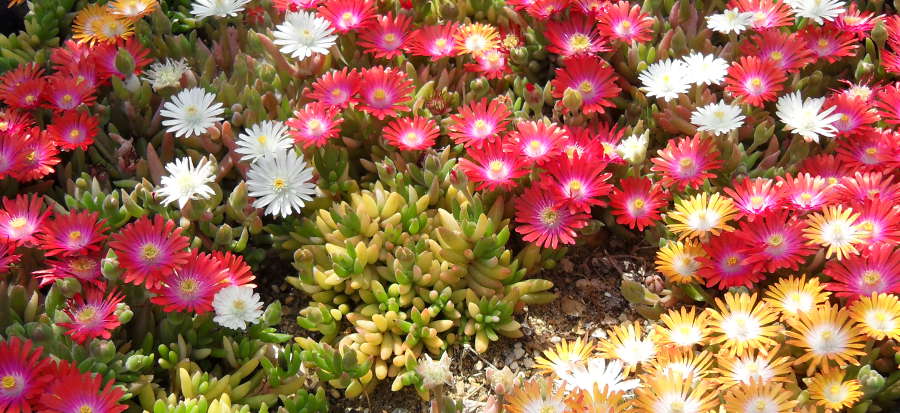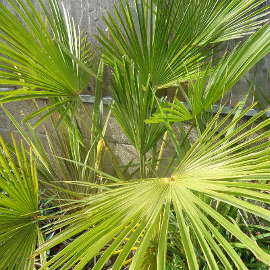

Delosperma 'jewel of desert' hardy ice plants
The 'Jewel of Desert' Delosperma grows with a mixture of flower colours and is very eye catching. It does seem strange they named this new range of Delospermas's Jewel of Desert rather than 'Jewel of the Desert' but the name is apt as these are very drought tolerant and from a distance sparkle (not literally) like jewels.

So what's so special about these hardy ice plants?
They have a long flowering period that lasts until the start of winter. The colours of the flowers range from white, yellow, orange red and purple. The combination of colours creates a candy colour effect.
Like many succulents they tolerate drought so you really don't have to water them. They do however require really good drainage so a soil that drains freely is required, they really do hate the damp although cold is not a problem.

Jewel of Desert compared to other Hardy Ice plants
Jewel of desert differs from other types of Delosperma in a number of ways. Firstly the flowers are much smaller, the size of a penny compared to a two pence coin size of the flowers of Cooperi and Nubigenum and other hardy ice plants.
The plant and foliage is also smaller and more compact and tend to grow at a much slower rate. The foliage of Jewel of Desert excels in foliage colour showing a range of distinct leaf colours compared to other varieties that tend to have colour tinges rather than dramatic colour changes.

This Delosperma is evergreen in the UK and should survive most winters
Like many Delosperma or Hardy Ice Plants they are evergreen and whilst they will not flower through the frosts they will remain green and provide tight ground cover. They are hardy but dislike damp so keep well drained.
The plants themselves are quite compact with smaller flowers than other Delosperma cooperi although I think this is a good thing having more densely packed growth.

Beware slugs, they love Delosperma
Slugs tend to love Delosperma so I'd recommend growing them in a large shallow pot and placing them in a sunny spot off the ground. This will improve drainage, deter slugs and give Jewel of Desert what it loves most, the Sun.

Other Delosperma
If you have never grown any type of Delosperma and cannot get hold of the new Desert series I can strongly recommend Delosperma nubigenum which is reliably hardy and winter proof and has a lovely yellow flower similar to Peridot but completely yellow.
Delosperma cooperi is also good producing a purple flower, again mind the slugs if you do not use slug pellets like me then young plants will be eaten to the ground. D.lavisiae also has a purple-pink flower and is known to be cold and wet hardy.
Also look out for the new Delosperma 'Fire Spinner' which has a multicolour flower but as with many new introductions come with a hefty price tag.

Summer 2013 Update
Have added updated pictures showing the plants as they are in August 2013. Over the last month the plants have bulked out and spread quite a bit and will eventually fill the pot and hopefully overspill to great effect.
They continue to flower and I have not been removing the faded flowers as I wanted to see if they set viable seed. Removing the flowers will encourage more to be produced.
Jewel of Desert is much tidier with a much more compact habit compared to other Delosperma cooperi. The flowers also tend to be smaller in size. So far no pests or plants lost but the real test will be how they handle our UK winters.
From experience it appears that Rosequartz and Garnet produce the most flowers and appear to have bulked out the most over the summer. White Moonstone and Topaz produce fewers flowers whilst the yellow Peridot had the least.

October 2013 Update - Autumn
It's October and Delosperma 'Jewel of Desert' is less floriferous although I haven't been removing seed pods as I want to see if any seeds set naturally. Also by keeping the seed pods intact you can see how many flowers it has actually produced over the summer.

Autumn and Winter foliage colours
I am expecting the foliage to change colour which will provide additional interest throughout the coldest months. Other more commonly grown Hardy Ice Plants grown in the UK tend to produce an attractive coloured tips in oranges, pinks and red hues.
So far I have noticed Delosperma Peridot has gradually coloured an orange red on the leaf tips whilst all the other varieties still remain pretty much green. This still remains my favourite because of the winter colour interest but mostly due to the brilliant yellow coloured flowers which white centres it produces.

Delosperma foliage colour change
The colours have slowly change from autumn to early spring as you can see from the updated pictures. Now in March 2014 you can clearly see the brighter spring colours which range from lime green, reds and pinks. As it gets warmer they will turn back to a deep rich green which will act as the perfect backdrop for the candy coloured daisy like flowers.

March 2014 Update
We've had mild 2013-2014 here in the UK so it wasn't really a great test for hardiness for Jewel of Desert but they should be just as hardy as many of the hardier Delosperma.
I mentioned previously about the foliage colour change that had already started in October where the tips of Peridot had started to turn rosy red. Well you won't be disappointed because the rich greens of summer have well and truly changed.
A year of growth
New growth seems to appear in early spring at the first sign of increased light and warmth. As I mentioned as this winter has been unusually mild with few significant frosts and no snow this may have caused new growth earlier than usual.
Suffice to say Delosperma 'Jewel of Desert' is a great performer and provides year round interest. It's a perfect pot plant as you never have to water it, should you forget. It does need direct sunshine for the flowers to open so a south facing aspect would give you the best display.
You should also definitely plant these en masse and mix up the colours to get that candy colour effect for most impact.
Delosperma 'Jewel of Desert' seeds
I can also confirm that 'Jewel of Desert' produces viable seeds. They don't seem to need a period of cold to germinate just warmth and light to get them started. As the seeds are mixed I am not going to know which variety has germinated until they flower, hopefully this summer.








Jewel of Desert series
The range includes plants of varying colours but with the same habit and foliage.
Garnet has red flowers with pink centre
Rosequartz with pink flowers
Moon Stone produces white flowers
Topaz, orange flowers with white centre
Ruby, red flowers with orange and white centre
Peridot, my favourite with yellow flowers and a white centre
Buy Delosperma
More Evergreen Plants...
As an Amazon Associate I earn from qualifying purchases








































